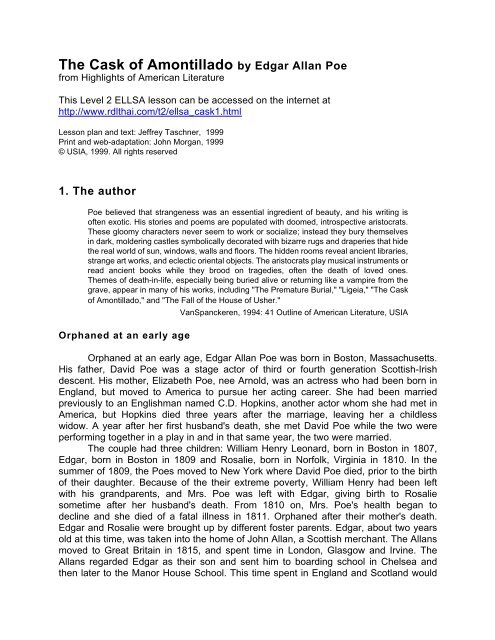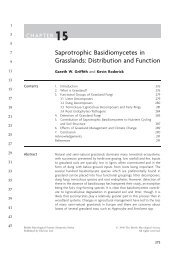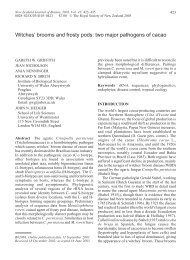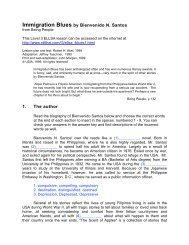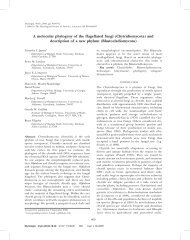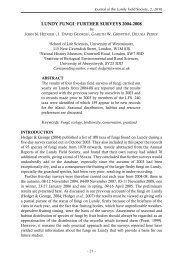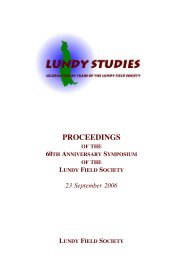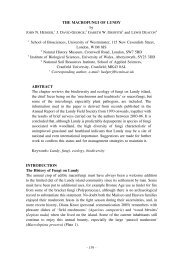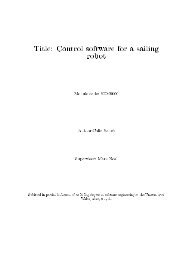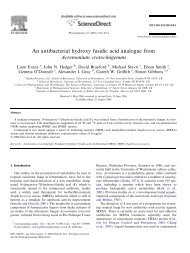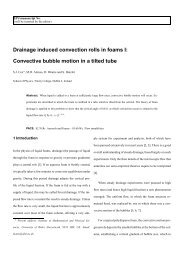The Cask of Amontillado by Edgar Allan Poe - Aberystwyth ...
The Cask of Amontillado by Edgar Allan Poe - Aberystwyth ...
The Cask of Amontillado by Edgar Allan Poe - Aberystwyth ...
You also want an ePaper? Increase the reach of your titles
YUMPU automatically turns print PDFs into web optimized ePapers that Google loves.
<strong>The</strong> <strong>Cask</strong> <strong>of</strong> <strong>Amontillado</strong> <strong>by</strong> <strong>Edgar</strong> <strong>Allan</strong> <strong>Poe</strong><br />
from Highlights <strong>of</strong> American Literature<br />
This Level 2 ELLSA lesson can be accessed on the internet at<br />
http://www.rdlthai.com/t2/ellsa_cask1.html<br />
Lesson plan and text: Jeffrey Taschner, 1999<br />
Print and web-adaptation: John Morgan, 1999<br />
© USIA, 1999. All rights reserved<br />
1. <strong>The</strong> author<br />
<strong>Poe</strong> believed that strangeness was an essential ingredient <strong>of</strong> beauty, and his writing is<br />
<strong>of</strong>ten exotic. His stories and poems are populated with doomed, introspective aristocrats.<br />
<strong>The</strong>se gloomy characters never seem to work or socialize; instead they bury themselves<br />
in dark, moldering castles symbolically decorated with bizarre rugs and draperies that hide<br />
the real world <strong>of</strong> sun, windows, walls and floors. <strong>The</strong> hidden rooms reveal ancient libraries,<br />
strange art works, and eclectic oriental objects. <strong>The</strong> aristocrats play musical instruments or<br />
read ancient books while they brood on tragedies, <strong>of</strong>ten the death <strong>of</strong> loved ones.<br />
<strong>The</strong>mes <strong>of</strong> death-in-life, especially being buried alive or returning like a vampire from the<br />
grave, appear in many <strong>of</strong> his works, including "<strong>The</strong> Premature Burial," "Ligeia," "<strong>The</strong> <strong>Cask</strong><br />
<strong>of</strong> <strong>Amontillado</strong>," and "<strong>The</strong> Fall <strong>of</strong> the House <strong>of</strong> Usher."<br />
Orphaned at an early age<br />
VanSpanckeren, 1994: 41 Outline <strong>of</strong> American Literature, USIA<br />
Orphaned at an early age, <strong>Edgar</strong> <strong>Allan</strong> <strong>Poe</strong> was born in Boston, Massachusetts.<br />
His father, David <strong>Poe</strong> was a stage actor <strong>of</strong> third or fourth generation Scottish-Irish<br />
descent. His mother, Elizabeth <strong>Poe</strong>, nee Arnold, was an actress who had been born in<br />
England, but moved to America to pursue her acting career. She had been married<br />
previously to an Englishman named C.D. Hopkins, another actor whom she had met in<br />
America, but Hopkins died three years after the marriage, leaving her a childless<br />
widow. A year after her first husband's death, she met David <strong>Poe</strong> while the two were<br />
performing together in a play in and in that same year, the two were married.<br />
<strong>The</strong> couple had three children: William Henry Leonard, born in Boston in 1807,<br />
<strong>Edgar</strong>, born in Boston in 1809 and Rosalie, born in Norfolk, Virginia in 1810. In the<br />
summer <strong>of</strong> 1809, the <strong>Poe</strong>s moved to New York where David <strong>Poe</strong> died, prior to the birth<br />
<strong>of</strong> their daughter. Because <strong>of</strong> the their extreme poverty, William Henry had been left<br />
with his grandparents, and Mrs. <strong>Poe</strong> was left with <strong>Edgar</strong>, giving birth to Rosalie<br />
sometime after her husband's death. From 1810 on, Mrs. <strong>Poe</strong>'s health began to<br />
decline and she died <strong>of</strong> a fatal illness in 1811. Orphaned after their mother's death.<br />
<strong>Edgar</strong> and Rosalie were brought up <strong>by</strong> different foster parents. <strong>Edgar</strong>, about two years<br />
old at this time, was taken into the home <strong>of</strong> John <strong>Allan</strong>, a Scottish merchant. <strong>The</strong> <strong>Allan</strong>s<br />
moved to Great Britain in 1815, and spent time in London, Glasgow and Irvine. <strong>The</strong><br />
<strong>Allan</strong>s regarded <strong>Edgar</strong> as their son and sent him to boarding school in Chelsea and<br />
then later to the Manor House School. This time spent in England and Scotland would
have a lasting impression on young <strong>Edgar</strong>, and would figure in his short story, William<br />
Wilson.<br />
1. How and when did <strong>Edgar</strong>'s mother become a widow?<br />
2. How many brothers and sisters did <strong>Edgar</strong> have, and what were their names?<br />
<strong>The</strong> women in his early life<br />
<strong>The</strong> <strong>Allan</strong>s returned to America in 1820, and although John <strong>Allan</strong>'s businesses<br />
were failing, they lived a comfortable life. <strong>Edgar</strong> enrolled at William Burke's Academy<br />
in Richmond, where he excelled in languages, drama, and swimming. He began to<br />
write poetry early on and in 1823, composed 'For Helen'. <strong>The</strong> poem was inspired <strong>by</strong><br />
his schoolmate's mother, Jane Stith Stanard, with whom the brilliant young <strong>Edgar</strong> had<br />
become romantically involved. Mrs. Stanard went mad and died shortly afterwards, a<br />
tragic loss which <strong>Edgar</strong> had difficulty overcoming. He was reported to have held late<br />
night vigils at her grave for some time afterward, until he developed an interest in girls<br />
his own age, for whom he also composed lyric poetry.<br />
Of the women in <strong>Poe</strong>'s life, much has been written. His mother died an early<br />
death, leaving him an orphan. Mrs. Stanard, his first love, went mad and died. His<br />
sister Rosalie was retarded and <strong>Edgar</strong> neglected her as a mere memory <strong>of</strong> an<br />
increasingly troubled past. Later, before enrolling at the University <strong>of</strong> Virginia at<br />
Richmond, he had another forbidden affair with a young neighbor, Elmira Royster,<br />
whose parents would have nothing to do with <strong>Edgar</strong> after they discovered that his<br />
foster-father had cut him out <strong>of</strong> his will.<br />
1. Which sport did <strong>Edgar</strong> excel at?<br />
2. Who was the inspiration for "For Helen"?<br />
3. What was <strong>Edgar</strong>'s relation to this woman?<br />
On his own: the wild years<br />
John <strong>Allan</strong> continued to pay for <strong>Edgar</strong>'s tuition, but after an argument with his<br />
wife in which <strong>Edgar</strong> had sided with his step-mother, Mr. <strong>Allan</strong> began cutting back on<br />
his financial support for <strong>Edgar</strong>. <strong>Edgar</strong> began gambling and drinking heavily at school
and ran up debts in his step-father's name for $2500, a considerable sum at that time.<br />
In 1826, John <strong>Allan</strong> pulled <strong>Edgar</strong> out <strong>of</strong> the univerisity and refused to pay any <strong>of</strong> the<br />
gambling debts he had accumulated. He insisted that <strong>Edgar</strong> give up his literary<br />
aspirations and study law. This led to a quarrel between the two and <strong>Edgar</strong> packed his<br />
bags and left for Boston, then the literary capital <strong>of</strong> the United States.<br />
In Boston, <strong>Poe</strong> published his first collection <strong>of</strong> poems, "Tamerlane and Other<br />
<strong>Poe</strong>ms", under the pseudonym, Henri Le Rennét. Although it made him no money, it<br />
began to build a reputation for him under his pen-name. But he could not support<br />
himself. In Desperation, he joined the United States Army, enlisting under the name<br />
<strong>Edgar</strong> A. Perry on May 26, 1827. He spent two and a half years in the army and<br />
apparently had quite a bit <strong>of</strong> free time on his hands for he continued to write. It was<br />
during this time that he wrote "<strong>The</strong> Gold Bug", his classic detective story about codecracking<br />
and treasure-hunting.<br />
1. What were <strong>Edgar</strong>'s two main vices?<br />
2. Under what pen-name did he publish his first collection <strong>of</strong> poetry?<br />
3. Under what name did he enlist in the army?<br />
4. What famous story did he write during his first two and a half years in the army?<br />
His foster mother's death<br />
In 1829, <strong>Edgar</strong> was promoted to the rank <strong>of</strong> Sergeant-Major and was posted to<br />
Fort Monroe, Virginia, just a few miles from Richmond. He had begun thinking about<br />
enrolling at West Point, the prestigious American military academy. Meanwhile back in<br />
Richmond his foster mother, whom he loved deeply was dying and wanted to see her<br />
'dear boy' before she died. After much delay, John <strong>Allan</strong>, who had all but disowned<br />
<strong>Edgar</strong>, sent for him, but it was too late. She died before <strong>Edgar</strong> arrived, and despite her<br />
request not to be buried until her foster son returned, her husband went ahead with the<br />
funeral without waiting for <strong>Edgar</strong>'s return. When <strong>Poe</strong> finally arrived, the person he<br />
loved most was already buried underground. He grieved deeply at the cemetery, and<br />
his graveside manners, echoing his vigils <strong>of</strong> Mrs. Stanard's grave, seem to anticipate<br />
the stories <strong>of</strong> prematural burial, such as "<strong>The</strong> Tell-Tale Heart", "<strong>The</strong> Premature Burial",<br />
as well as the living entombment <strong>of</strong> Fortunato in "<strong>The</strong> <strong>Cask</strong> <strong>of</strong> <strong>Amontillado</strong>" and the<br />
walling up <strong>of</strong> the corpse in "<strong>The</strong> Black Cat".
1. Who did <strong>Edgar</strong> love most up to this point in his life?<br />
2. What is a foster parent?<br />
3. Which events were the inspiration for <strong>Edgar</strong>'s various stories about burial, wallingup<br />
and entombment?<br />
West Point<br />
Prior to her death, Mrs. <strong>Allan</strong> made her husband promise never to abandon<br />
<strong>Edgar</strong>. <strong>Edgar</strong> moved to Baltimore and John <strong>Allan</strong> continued to send him small sums <strong>of</strong><br />
money, just barely enough for <strong>Edgar</strong> to get <strong>by</strong>. On July 1, 1830 <strong>Edgar</strong> was admitted as<br />
a cadet at West Point. However, <strong>Poe</strong> was not suited to the military and did not even<br />
last one year. Early on, he wrote to his foster-father requesting permission to drop-out.<br />
<strong>The</strong>n, in early 1831, <strong>Poe</strong> received a letter from John <strong>Allan</strong> who, furious at <strong>Poe</strong>'s desire<br />
to quit the academy, disowned him once and for all. Realizing how completely cut-<strong>of</strong>f<br />
he now was from his past, <strong>Poe</strong> decided to leave West Point to pursue a full-time<br />
literary career.<br />
1. What is West Point?<br />
2. How long did <strong>Edgar</strong> last at West Point?<br />
3. Why did John <strong>Allan</strong> finally disown <strong>Edgar</strong>?<br />
Baltimore<br />
After leaving West Point, <strong>Poe</strong> went to live in Baltimore with his aunt, Mrs. Maria<br />
Clemm, where he went to work for the Southern Literary Messenger. In 1835, he<br />
became editor <strong>of</strong> this magazine and also married his cousin, Virginia, who was only<br />
thirteen years old at the time. <strong>The</strong> couple stayed with Mrs. Clemm who was a devoted<br />
mother to both <strong>of</strong> them. But the money <strong>Poe</strong> earned, even as an editor, was inadequate.<br />
Poverty, combined with frequent drinking binges, began to take their toll on <strong>Poe</strong>'s<br />
physical health and emotional equilibrium. He became progressively more detached
from reality, in pursuit <strong>of</strong> vague literary goals and unrealistic business plans. He left<br />
<strong>The</strong> Messenger in 1837 with unrealistic plans <strong>of</strong> establishing his own magazine and<br />
getting rich.<br />
1. Who did <strong>Edgar</strong> finally marry?<br />
2. What were two <strong>of</strong> his most serious problems?<br />
3. What was his great ambition at this time?<br />
Poverty & Death<br />
For the rest <strong>of</strong> his life poe worked <strong>of</strong>f-and-on as a writer and editor for various<br />
magazines in Philadelphia and New York. He wrote many <strong>of</strong> his best stories over the<br />
next few years, but earned very little money from them ("Ligeia", one <strong>of</strong> his finest<br />
stories earned him only ten dollars.) His steepest downward descent began when his<br />
wife became seriously ill, and then later contracted tuberculosis and died in 1847, at<br />
the age <strong>of</strong> twenty-four. <strong>Poe</strong> stumbled through several more relationships with women,<br />
vainly trying to stabilize himself, and was engaged to be married twice during the last<br />
year <strong>of</strong> his life. His second engagement was to a Richmond widow who had once<br />
been his childhood sweetheart. Just before he was to be remarried, he was on his way<br />
back north from a business trip to Richmond, and he decided to stop <strong>of</strong>f in Baltimore,<br />
presumably for a last binge before he got married. Nobody knows what he did there or<br />
who he was with, but he was found six days later, lying unconscious in the rain with his<br />
clothes badly ripped as though he had been in some sort <strong>of</strong> fight. Though still alive, he<br />
never regained consciousness and died shortly after he was found <strong>by</strong> the authorities.<br />
1. What event really caused <strong>Edgar</strong> to lose morale and slip into a decline?<br />
2. What is a drinking binge?<br />
3. How do you believe <strong>Edgar</strong> actually died?
Pre-story<br />
<strong>Edgar</strong> <strong>Allan</strong> <strong>Poe</strong>'s gothic tale, <strong>The</strong> cask <strong>of</strong> <strong>Amontillado</strong>, is really a story about<br />
the loss <strong>of</strong> face, or "amor propio". Face is a very important aspect <strong>of</strong> all Southeast<br />
Asian cultures.<br />
What is the expression in your language for the loss <strong>of</strong> face? What other<br />
English words come to mind when you think <strong>of</strong> the word "face" in this sense? Think <strong>of</strong><br />
as many words as you can, or consult the thesaurus in the pull down menu under<br />
Tools in your word processor.<br />
Which <strong>of</strong> the words below seem closest to your culture's notion <strong>of</strong> face? Check<br />
a thesaurus for synonyms if you are not sure.<br />
• pride ❒<br />
• self-esteem ❒<br />
• self-respect ❒<br />
• amour-propre ❒<br />
• self-love ❒<br />
• self-confidence ❒<br />
• dignity ❒<br />
• honor ❒<br />
• respectability ❒<br />
• nobility ❒<br />
Discuss these ideas with a friend. Think <strong>of</strong> some ways that people in your<br />
country try to gain, or maintain, face with friends, colleagues and strangers. How can a<br />
person lose face among friends, colleagues or strangers?<br />
Again, think <strong>of</strong> some examples. Think <strong>of</strong> a time when you did something to gain<br />
face. Was there any single time in your life when you gained the most face among your<br />
friends, family, teachers or colleagues? Can you think <strong>of</strong> an embarrassing incident that<br />
happened to you, or to somebody you know, in which you or the other person lost<br />
face? Are there times when a foreign visitor to your country might cause somebody to<br />
lose face without knowing it? Think <strong>of</strong> some advice that you give a foreign visitor about<br />
your country's culture.<br />
An excellent synopsis <strong>of</strong> <strong>The</strong> <strong>Cask</strong> <strong>of</strong> <strong>Amontillado</strong> can be found at:<br />
http://www.nadn.navy.mil/EnglishDept/poeperplex/thepoepe.htm
In-story<br />
<strong>The</strong> Characters<br />
1. How many characters does <strong>Poe</strong> include in <strong>The</strong> <strong>Cask</strong> <strong>of</strong> <strong>Amontillado</strong>? What are<br />
there names?<br />
2. What drink are the French most famous for?<br />
3. Does Montresor have something <strong>of</strong> great value to him which we might consider<br />
to be his treasure? Hint: It is not the <strong>Amontillado</strong> wine (which is Spanish<br />
anyway, not French, and doesn't really exist-it is merely a trick to get Fortunato<br />
to go down into the catacombs).<br />
<strong>Poe</strong> is not easy reading. His language is old-fashioned and his sentences are<br />
long and <strong>of</strong>ten complex. One <strong>of</strong> the main purposes <strong>of</strong> this on-line lesson is to guide<br />
teachers and students through the events <strong>of</strong> the story, and their interpretations.<br />
<strong>The</strong> Insult<br />
How did Fortunato cause Montresor to lose face in the story?<br />
<strong>The</strong> third paragraph <strong>of</strong> the story appears in full below. Read it carefully and try to<br />
imagine how Fortunato might have insulted Montresor.<br />
"He had a weak point—this Fortunato—although in other regards he was a man to be<br />
respected and even feared. He prided himself on his connoisseurship in wine. Few<br />
Italians have the true virtuoso spirit. For the most part their enthusiasm is adopted to suit<br />
the time and opportunity to practice imposture upon the British and Austrian millionaires.<br />
In painting and gemmary Fortunato, like his countrymen, was a quack, but in the matter <strong>of</strong><br />
old wines he was sincere. In this respect I did not differ from him materially;—I was skillful in<br />
the Italian vintages myself, and bought largely whenever I could."<br />
Does Montresor seem to have much respect for Italians? Which lines in the<br />
paragraph above reveal his contempt?<br />
What was Fortunato's insult?<br />
Vengeance: <strong>The</strong> trail <strong>of</strong> bottles<br />
<strong>Edgar</strong> Allen <strong>Poe</strong> was fond <strong>of</strong> drinking alcohol and knew his wines as well as the<br />
characters in <strong>The</strong> <strong>Cask</strong> <strong>of</strong> <strong>Amontillado</strong>. As they go deeper and deeper into Montresor's<br />
catacombs, they drink two bottles <strong>of</strong> French wine and Fortunato believes they are on<br />
their way to find a third bottle <strong>of</strong> fine old Spanish wine.<br />
Find the names <strong>of</strong> the two wines, they drink and the one that Montresor uses to<br />
lure Fortunato into the catacombs.<br />
Why does Montresor entertain Fortunato with wines from his collection?
In what two ways does Montresor imprison Fortunato?<br />
<strong>The</strong> story, <strong>The</strong> <strong>Cask</strong> <strong>of</strong> <strong>Amontillado</strong>, first appeared in an anthology <strong>of</strong> <strong>Poe</strong>'s<br />
stories entitled Tales <strong>of</strong> the Grotesque and Arabesque. Arabesque comes from the<br />
word Arab and refers to ornaments, decorations and motifs in Arabic art, where figures<br />
<strong>of</strong> flowers, fruits and sometimes animal outlines appear in elaborate patterns <strong>of</strong><br />
interlaced lines. particularly those which have been borrowed <strong>by</strong> other cultures. Such<br />
arabesque patterns are reflected in some <strong>of</strong> the designs and motifs <strong>of</strong> the batik <strong>of</strong><br />
Indonesia and Malaysia.<br />
By analogy, then, an arabesque story is one <strong>of</strong> intricate design, which is told<br />
through the use <strong>of</strong> fanciful language. Because arabesque graphic designs sometimes<br />
depict fantastic creatures, <strong>Poe</strong> and others also applied this term to tales that dealt with<br />
fantastic or supernatural happenings. Grotesque refers to something distorted, ugly,<br />
abnormal, fantastic, or bizarre to the point <strong>of</strong> being ludicrous or absurd. In a grotesque<br />
story, characters are physically or psychologically deformed and engage in actions<br />
which may be abnormal or comically absurd.<br />
In what ways is <strong>The</strong> <strong>Cask</strong> <strong>of</strong> <strong>Amontillado</strong> grotesque? First, which <strong>of</strong> Montresor's<br />
actions are abnormal?<br />
Is there anything grotesque about Fortunato?<br />
Humor Hunt<br />
<strong>The</strong>re are also numerous comic touches which <strong>Poe</strong> adds to this grotesque tale. Try to<br />
find 10 examples <strong>of</strong> <strong>Poe</strong>'s use <strong>of</strong> grotesque humor. Follow this trail <strong>of</strong> humor<br />
chronologically through the story.<br />
• Fortunato's name means lucky in Italian. This is ironic language play, as he was<br />
hardly the lucky one in this story.<br />
• Fortunato is dressed in a court jester's or fool's garb, complete with striped outfit<br />
and cap and bells.<br />
• <strong>The</strong> jingling <strong>of</strong> the bells <strong>of</strong> the cap in the catacombs.<br />
• Montresor's exaggerated concern for Fortunato's health.<br />
• A joke: Not knowing Montresor plans to kill him, Fortunato says, I shall not die <strong>of</strong><br />
a cough. To which Montresor replies, True-true.<br />
• Pun: Montresor telling Fortunato he is a mason. (Fortunato was referring to<br />
members <strong>of</strong> the society <strong>of</strong> Freemasons). Montresor reveals the trowel (a tool<br />
used to apply mortar or cement) which he will use to build the wall which<br />
entombs Fortunato.<br />
• Fortunato's drunken condition.<br />
• Fortunato bumping into the dead end <strong>of</strong> the niche where he will be entombed<br />
and then looking bewildered.<br />
• Fortunato's delirious laughter at the end.<br />
• Another pun: Let us be gone. Montresor repeats Fortunato's words, not saying<br />
that they shall leave together, but that Fortunato will be gone from this life.
Exercises<br />
Testing <strong>Poe</strong>'s <strong>The</strong>ory <strong>of</strong> the Short Story on his own writing<br />
Many critics consider <strong>Poe</strong> to be the father <strong>of</strong> the modern short story. He was the<br />
first writer to define the short story as a distinct literary form. In a review <strong>of</strong> Nathaniel<br />
Hawthorne's anthology, Twice-Told Tales in Graham's Magazine, May 1842, he<br />
described his personal theory on how to construct a "tale":<br />
5 rules <strong>of</strong> short story writing following <strong>Poe</strong>'s principles<br />
Try to make a list <strong>of</strong> 5 rules for writing a short story as implied in <strong>Poe</strong>'s essay. A<br />
keyword has been given below to help with scanning the text. Try writing your answers<br />
down.<br />
"A skillful literary artist has constructed a tale. If wise, he has not fashioned his thoughts to<br />
accommodate his incidents: but having conceived, with deliberate care, a certain unique<br />
or single effect to be wrought out, he then invents such incidents—he then combines<br />
such events as may best aid him in establishing this preconceived effect. If his very initial<br />
sentence tends not to the outbringing <strong>of</strong> this effect, then he has failed in his first step. In<br />
the whole composition there should be no work written, <strong>of</strong> which the tendency, direct or<br />
indirect, is not to the one pre-established design. And <strong>by</strong> such means, with such care and<br />
skill, a picture is at length painted which leaves in the mind <strong>of</strong> him who contemplates it with<br />
a kindred art, a sense <strong>of</strong> the fullest satisfaction."<br />
1. Keyword: effect<br />
2. Keyword: establish<br />
3. Keyword: first sentence<br />
4. Keyword: pre-established<br />
5. Keyword: satisfaction
How well does <strong>Poe</strong> follow his own rules?<br />
1. What is the single effect <strong>of</strong> the story on the reader?<br />
2. How do all incidents help <strong>Poe</strong> to establish this effect?<br />
3. How does the first sentence bring out the horror <strong>of</strong> the tale?<br />
4. How does the whole story follow a single pre-established design?<br />
5. Does the reader feel satisfied at the end <strong>of</strong> the story?<br />
Follow-up<br />
1. Dramitization: Re-write <strong>The</strong> <strong>Cask</strong> <strong>of</strong> <strong>Amontillado</strong> as a play in dialog form with the two<br />
characters, Montresor and Fortunato and then stage a play version <strong>of</strong> the story.<br />
2. Modernization: Divide the story up into equal sections <strong>of</strong> 3 or 4 paragraphs and give<br />
each section to a group <strong>of</strong> students or teachers to rewrite and modernize into a simpler<br />
and more contemporary prose style.<br />
3. Shift the Point <strong>of</strong> View: Rewrite the story from Fortunato's point <strong>of</strong> view.<br />
4. Design a story grammar chart for another story in the ELLSA site or from one <strong>of</strong> the<br />
e-text links.
ANSWER KEY<br />
2. Author<br />
Orphaned at an early age: answers<br />
1. His mother became a widow when her husband died three years after their<br />
marriage.<br />
2. <strong>Edgar</strong> had one brother and one sister. His brother's name was William, and his<br />
sister's name was Rosalie.<br />
<strong>The</strong> women in his early life: answers<br />
1. He excelled at swimming.<br />
2. Jane Stith Stanard.<br />
3. She was his classmate's mother.<br />
On his own: the wild years: answers<br />
1. Drinking and gambling.<br />
2. Henri le Rennét.<br />
3. <strong>Edgar</strong> A. Perry.<br />
4. <strong>The</strong> Gold Bug.<br />
His foster mother's death: answers<br />
1. His foster mother.<br />
2. An adoptive parent.<br />
3. His mother's burial before his arrival at her funeral and also Mrs Stanard's<br />
death and the vigil he kept over her grave.<br />
West Point: answers<br />
1. A military academy for <strong>of</strong>ficers.<br />
2. Less than a year.<br />
3. Because <strong>Edgar</strong> wanted to quit West Point.<br />
Baltimore: answers<br />
1. His 13 year old cousin.<br />
2. Drinking and poverty.<br />
3. To start his own literary magazine.
Poverty and death: answers<br />
1. His wife's illness and death.<br />
2. A prolonged period <strong>of</strong> alcohol consumption.<br />
3. Just a week before he was found unconscious, he went on another drinking<br />
binge during a business trip to Philadelphia. <strong>The</strong>re was an election going on at<br />
the time <strong>of</strong> <strong>Edgar</strong>'s final, fatal visit to Baltimore. Some people believe that he got<br />
drunk and was beaten up, either over and election issue, or in an attempt at<br />
vote-buying.<br />
In-story<br />
Answer 1 Montresor, Fortunato and Luchesi<br />
Montresor is a French name meaning "my treasure".<br />
Answer 2 Wine<br />
Answer 3 His pride and the pride <strong>of</strong> his French family heritage. Perhaps his devious<br />
plot <strong>of</strong> revenge.<br />
Answer 4 Montresor does not have much respect for Italians. He feels the French are<br />
superior, especially with respect to wine. <strong>The</strong> following lines reveal this (p135,<br />
paragraph 3): "Few Italians have the true virtuoso spirit. For the most part their<br />
enthusiasm is adopted to suit the time and opportunity to practice imposture upon the<br />
British and Austrian millionaires. In painting and gemmary Fortunato, like his<br />
countrymen, was a quack..."<br />
Answer 5 <strong>Poe</strong> does not tell us directly, but only implies it in the third paragraph (p<br />
135, paragraph 3): "...but in the matter <strong>of</strong> old wines he was sincere. In this respect I did<br />
not differ from him materially;—I was skillful in the Italian vintages myself, and bought<br />
largely whenever I could." <strong>Poe</strong> reveals a potential source <strong>of</strong> rivalry or competition<br />
between the two: their expertise in wine. Fortunato probably insulted Montresor's<br />
knowledge <strong>of</strong> vintage Italian wines. By insulting Montresor, Fortunato has insulted<br />
Montresor's family name and the French race.<br />
Answer 6 "Medoc" and "de Grave" (the French wines) "<strong>Amontillado</strong>" (the Spanish<br />
wine; Montresor's ruse to lead Fortunato down into the catacombs.<br />
Answer 7 Montresor wants to get Fortunato drunk enough to be able to trap him in<br />
his plan <strong>of</strong> vengeance.<br />
Answer 8 He fetters (chains and locks) Fortunato to the wall <strong>of</strong> the catacombs. He<br />
builds a wall to close Fortunato <strong>of</strong>f in a small corner <strong>of</strong> the catacombs, where<br />
Montresor will leave him to die.
Answer 9 <strong>The</strong> whole obsessive plot <strong>of</strong> vengeance. <strong>The</strong> fettering and entombment <strong>of</strong><br />
Fortunato. Montresor's sick sense <strong>of</strong> humor.<br />
Answer 10 His obsession with alcohol. His drunkenness. His tendency to berate<br />
Luchesi (he may have been drunk and may have insulted Montresor in a similar<br />
fashion). His manic laughter.<br />
Exercises<br />
1. A story should try to achieve a single effect.<br />
2. All incidents and events <strong>of</strong> a short story should help the author to establish this<br />
effect.<br />
3. <strong>The</strong> very first sentence <strong>of</strong> the story should bring out this effect.<br />
4. <strong>The</strong> whole composition should follow the author's pre-established design.<br />
5. A reader should feel a sense <strong>of</strong> full satisfaction from having read the story.<br />
Answer 1 Shock, horror (at Montresor's elaborate and mad plot to avenge his<br />
wounded pride against Fortunato).<br />
Answer 2 Montresor has everything planned out carefully, and we descend into the<br />
catacombs with Montresor as our guide. He leads us directly to his crime <strong>of</strong> vengeance<br />
with no detours.<br />
Answer 3 Montresor tells us in the very first sentence that he has vowed to seek<br />
revenge against Fortunato. <strong>The</strong> crime and madness move forward immediately from<br />
there.<br />
Answer 4 <strong>Poe</strong>'s plot is the same as Montresor's plan. Although we don't know at first<br />
how his revenge will be exacted, Montresor hints (the trowel) and then realizes his<br />
horrible plan to entomb Fortunato alive in the catacombs.<br />
Answer 5 Montresor vowed that he would get his revenge against Fortunato. By the<br />
end <strong>of</strong> the story, we have watched his plan unfold and witnessed his crime <strong>of</strong><br />
vengeance. As the last stone goes into place, Montresor replaces the bones against<br />
the new wall (Fortunato's tomb) and <strong>Poe</strong> closes with a ubiquitous "Rest in Peace". This<br />
is like "<strong>The</strong> End" rolling across the screen at the end <strong>of</strong> a film.


